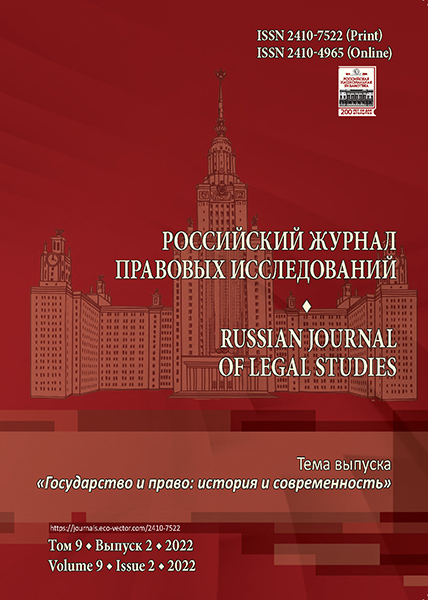Органы местного самоуправления в системе институтов гражданского общества
- Авторы: Никитина Е.Е.1
-
Учреждения:
- Институт законодательства и сравнительного правоведения при Правительстве Российской Федерации
- Выпуск: Том 9, № 2 (2022)
- Страницы: 41-47
- Раздел: Конституционное право
- Статья получена: 20.06.2022
- Статья одобрена: 23.06.2022
- Статья опубликована: 18.07.2022
- URL: https://journals.eco-vector.com/2410-7522/article/view/108873
- DOI: https://doi.org/10.17816/RJLS108873
- ID: 108873
Цитировать
Полный текст
Аннотация
Изменения общественных отношений и высокий уровень гражданской активности привели к обновлению Конституции Российской Федерации и появлению в ее тексте таких категорий, как «гражданское общество», «институты гражданского общества». Важным результатом конституционной модернизации стало выделение и закрепление в Конституции Российской Федерации основных форм взаимодействия институтов гражданского общества и органов публичной власти. Для реализации конституционных положений необходимо дальнейшее развитие теоретических представлений о закономерностях развития и функционировании структурных элементов современного общества, об их взаимосвязях с органами публичной власти.
Правовые характеристики института гражданского общества исследуются на примере местного самоуправления. Автор полагает, что местное самоуправление не может быть отнесено к институтам гражданского общества в праве, поскольку оно не обладает качествами, характеризующими институт гражданского общества: независимостью и автономностью деятельности. В соответствии с законодательством Российской Федерации значительная часть деятельности органов местного самоуправления, включая их формирование, происходит в рамках осуществления ими публичной власти. И только отдельные элементы их деятельности, в частности реализация форм непосредственной демократии, могут быть отнесены к сфере гражданского общества. Автор предлагает рассматривать их с точки зрения правовой теории, касающейся вопросов гражданского общества, как формы взаимодействия институтов гражданского общества и органов публичной власти.
В статье исследуется характер взаимосвязи гражданского общества и местного самоуправления. Обосновывается тезис, согласно которому действующее законодательство в данной области может не обеспечивать эффективность участия граждан и их объединений в решении вопросов местного значения. Кроме того, в статье делается вывод о необходимости совершенствования регулирования правовых форм взаимодействия органов местного самоуправления и институтов гражданского общества для повышения эффективности их сотрудничества.
Полный текст
Об авторах
Елена Евгеньевна Никитина
Институт законодательства и сравнительного правоведения при Правительстве Российской Федерации
Автор, ответственный за переписку.
Email: nikee@mail.ru
кандидат юридических наук
Россия, МоскваСписок литературы
- Авакьян С.А. Конституционное право России в 2-х т. Т.1. М., 2007.. 719 с.
- Овчинников И.И. Муниципальная власть (теоретико-правовые аспекты). М., 2017. 270 с.
- Мокрый В.С. Местное самоуправление в Российской Федерации как институт публичной власти и гражданского общества: автореф. дис. ... д-ра юрид. наук. М., 2003. 56 с.
- Овчинников И.И., Писарев А.Н. Актуальные проблемы муниципального права: учебник. М., 2020. 456 с.
- Гражданское общество как гарантия политического диалога и противодействия экстремизму: ключевые конституционно-правовые проблемы: монография / Рук. авт. кол. и отв. ред. С.А. Авакьян. М., 2015. 652 с.
- Искаков И.Ж. Гражданское общество и его институты в современной России: дис. ... канд. юрид. наук. СПб., 2004. 193 с.
- Тихомиров Ю.А. Гражданское общество в фокусе права // Журнал российского права. 2013. № 10. С. 35–45.
- Киричек Е.В. Институты гражданского общества в решениях Конституционного Суда Российской Федерации и научной интерпретации // Политика и Общество. 2018. № 7. С. 40–49.
- Бондарь Н.С., Джагарян А. А. Местное самоуправление: законодательство и практика реализации (в свете региональной правовой политики). Серия «Библиотечка судебного конституционализма». Вып. 6. Ростов н/Д, 2016. 176 с.
- Гаврилов А.В. Государство и гражданское общество: функциональный анализ взаимодействия: автореф. дис. … канд. юрид. наук. Нижний Новгород, 2007. 26 с.
Дополнительные файлы








